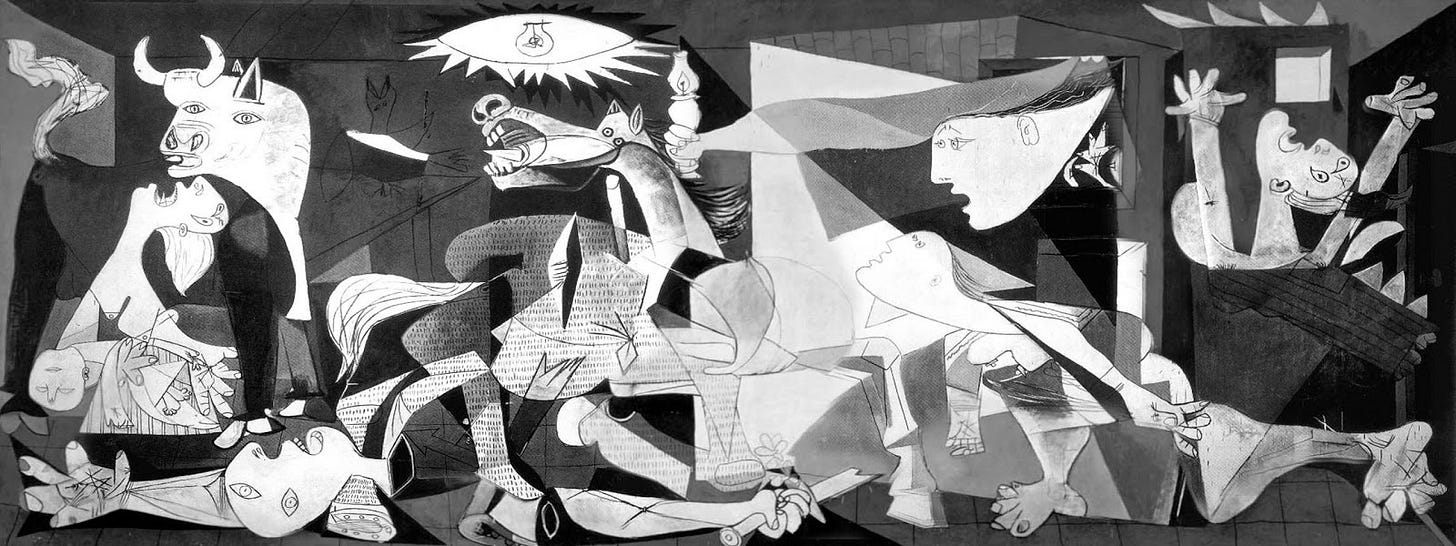Misinformation as Depoliticization
Guernica, Pablo Picasso, 1937
I’m writing this as sort of a follow-up to my last piece about the triumph of misinformation on Twitter, and to more fully lay out what my general thesis is on why it actually matters. As far as it relates to the field I actually care about—military conflict—misinformation primarily serves the purpose of inoculating people with a predisposition for inaction.
To begin, I’d like to focus on the Syrian Government’s use of chemical weapons to massacre civilians throughout the civil war in Syria probably stands out as the most notable instance of one of these misinformation campaigns prior to the current war in Ukraine.
Despite the clear and overwhelming evidence that the Assad Regime conducted the attacks, the Russian State almost immediately began a spin campaign headed by Sergei Lavrov and RT to promote various theories about how the Syrian rebels were actually behind the attacks. While the Russian doctrine of openly lying in the International Realm is deeply damaging—I’m more specifically interested here in the coterie of morons that amplify these claims.
The most well-known outfit from those days is a “news” organization called The Greyzone founded by Max Blumenthal—the trust fund son of Clinton speechwriter Sidney Blumenthal—whose primary contribution to the world has seemingly been to produce the most damaging media ecosystem since the John Birch Society had a newsletter. (Sincerely recommend checking out the linked Joshua Collins piece on The Greyzone, it’s quite a good piece of reporting)
Now in contrast to most people, I don’t actually think The Greyzone and their associated media ecosystem of people like Katie Halper, George Galloway, Vanessa Beeley, or Code Pink are actually on the Russian payroll. I just think they’re complete idiots that found an audience of like-minded morons that see conspiracies in everything thanks to an ideological view of the world in which the CIA has omnipotence on par with God.
The problem really emerges when this media ecosystem manages to extend its reach to people who don’t follow these conflicts with any real depth and see these stories written under a veneer of journalism. It’s not like I really blame people for the most part—most people don’t have the time or inclination to follow these wars with the level of detail to be familiar with bad actors or what the war actually looks like. So when someone sees a story shared widely about how the 2018 chemical attack in Ghouta was actually the work of rebels, why wouldn’t it seem plausible?
The same goes for the deluge of misinformation being spread across social media since February 24, 2022. Do I obviously know that it’s a ridiculous claim that Ukraine is secretly a Nazi State that’s running NATO bioweapons labs? Yeah, of course, that’s fucking moronic.
But for someone who probably couldn’t even find Kyiv on a map? Maybe they don’t really believe it, but they also probably don’t really know what to believe. The same applies to people who were inundated with 500 different theories of what actually happened at Ghouta or Douma. It frays your ability to actually form a clear and unequivocal sense of moral outrage necessary to propel a unified response. If you don’t exactly know what to believe, it’s rather hard to formulate a vision of what we ought to be doing in the world.
This kind of stuff matters even more in our current post-mass political age wherein political ideologies struggle to mobilize large uniform civic bases for a moral cause. Discourses are now largely dominated by a small minority of activist voices in the wake of the fracture and decentralization of communications—and if there exists dedicated ecosystems pushing misinformation it will have an outsized impact on what public opinion is.
I say this because while public support for Ukraine does remain rather high, fractures have begun to emerge amid major GOP candidates calling for the cessation of aid. Without a clear moral picture of what the United States should do—voters will just stop caring. It’s not going to be the case that the majority of the American public stops wanting Ukraine to succeed, it’s that they will be indifferent to the entire argument itself.
As the breakdown in having clear sources of information continues to beat away at the ability of voters to interpret the world, our political life will slowly move in the direction of a largely apathetic base of citizens that either defer their choices to the dubious ramblings of activists or drop out of the democratic process entirely.
It will end up resembling more the militia politics of Iraq (although not nearly as close to the severity, I just think the dynamic of depoliticization is similar) in which people who would otherwise feel an overwhelming moral urge to do the right thing largely opt out of civic participation in favor of dedicated ideologues who will dominate political life with their activist cliques. The American public will no longer feel the animating impulse to come to the aid of a democracy under invasion.
I chose Picasso’s Guernica as the image for this piece since although the event depicted is rather unequivocal—the horrors of the bombing of Guernica—there’s never really been any sort of critical consensus on what the symbolism of the painting itself represents. Amid a conflagration of noise and speculation over the events in front of our faces, we become lost and unable to say anything at all about what ought to be obvious to us. Then we just do nothing.

